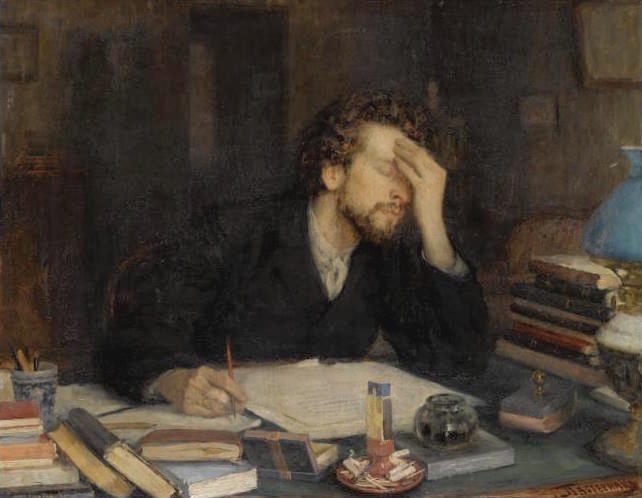So I decided to buck my trend and read the thing on the spot. Why are writers so good at this procrastination lark? This is what McArdle has to say:
Over the years, I developed a theory about why writers are such procrastinators: We were too good in English class. This sounds crazy, but hear me out.
Most writers were the kids who easily, almost automatically, got A's in English class. (There are exceptions, but they often also seem to be exceptions to the general writerly habit of putting off writing as long as possible.) At an early age, when grammar [i.e. primary] school teachers were struggling to inculcate the lesson that effort was the main key to success in school, these future scribblers gave the obvious lie to this assertion. Where others read haltingly, they were plowing two grades ahead in the reading workbooks. These are the kids who turned in a completed YA novel for their fifth-grade project. It isn’t that they never failed, but at a very early age, they didn’t have to fail much; their natural talents kept them at the head of the class.
This teaches a very bad, very false lesson: that success in work mostly depends on natural talent...
If you’ve spent most of your life cruising ahead on natural ability, doing what came easily and quickly, every word you write [as an adult] becomes a test of just how much ability you have...
It's a thought. I was one of those kids. It took me a (very) long time to get down to writing full-time. And I'm very good at procrastinating and of fearing that I won't be able to write the next book.
At the same time, I know I'm a better writer than I was 10 years ago, and I know that that's because of 10 years' worth of hard work.
So what do you think? Were you one of the ones McArdle describes? Has early facility been a disadvantage and/or procrastination instigator? Or did you struggle back in primary school and still embrace delaying tactics of every variety and shade? I'll be interested to hear your thoughts.
And, because I do like a post with a picture, here's one of my favourite images of the struggling writer ...
Leonid Pasternak's The Passion of Creation (wiki commons)
Joan Lennon's website.
Joan Lennon's blog.



4 comments:
I definitely recognise this, Joan!
I'll procrastinate by saying that I'm in two minds about the theory... I certainly excelled at reading, writing and art, but certainly not at anything involving maths,so I certainly learned that an easy ride was not something I could always expect.
I also learned that any piece of writing I was particuarly proud of and thought showed some improvement would get a '5/5 can do better' from the teacher, while writing I thought was run-of-the-mill and 'meh' would get 9/10, a gold star and a tick. So I learned to be wary of approval.
Thinking about it, I feel that my reluctance to actually get to to grips with writing is a question of time. How certain am I that this is the right direction to go? It's going to take me hours, even days, to write - what if it turns out to be wrong and I waste all that time? When I am certain and I've got that gut-feeling, 'Yes! This is it!' then I fling myself in. And rewriting, where I've got to stage where I'm pretty sure of the book's shape and plot points usually goes quickly.
Susan - I was the same! I was an entire year behind my class in maths, as we were streamed according to our English abilities.
Although, looking back at my schoolwork, I can see that I didn't always get high marks. Certainly my reading skill was always above average, but I was never stretched. No one suggested books for me to read, and although I eventually found my way to other books, I spent the years between primary six and late secondary school reading books that were far below my reading level. (Not to say that all of these were necessarily bad books!)
And my writing 'busy book' was full of comments such as 'But what did you DO?' and 'Not long enough.' I have to conclude that I was simply bored with the subject: me!
Post a Comment